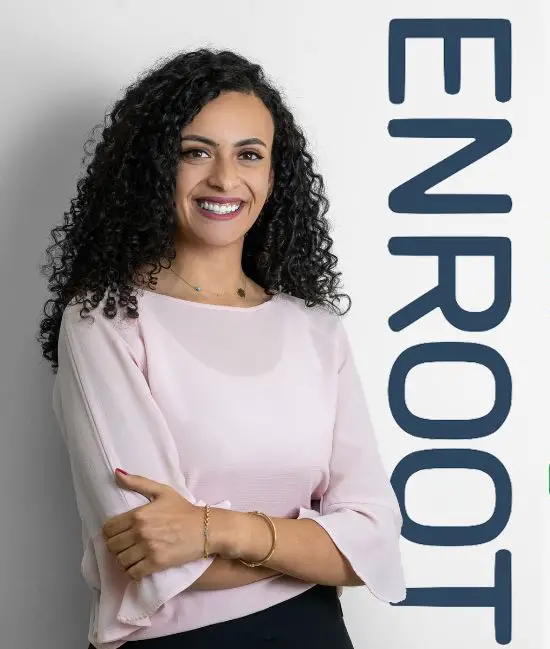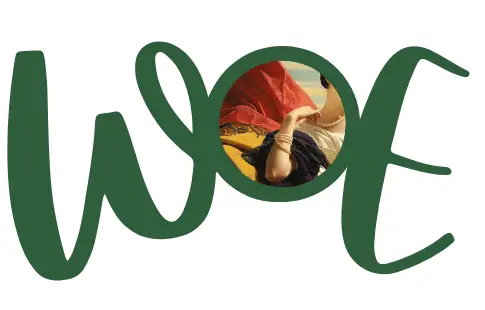November 17, 2022
Alexandra Kinias

Mariam AbdelKarim is the Business Development Manager at Enroot for Development. Passionate about the development field, with special interest in behavioral change, Mariam has always been interested in researching how behavioral change is induced, its drivers, and enablers.
She holds a MSc. in Development Economics from the University of Paris 1 Panthéone Sorbonne, through which she explored several approaches to induce local economic and social development in challenging contexts. Mariam is responsible for the mobilization of new business opportunities, design of new projects, establishing partnerships. She is also in charge of monitoring and evaluation assignments/activities within Enroot.
WoE: Tell us about Enroot, and the scope of its work.
MA: Enroot is a social purpose enterprise established in 2018 aiming to foster women and youth empowerment in lagging regions across Egypt, Middle East, and Africa. Our scope of work focuses on three main pillars: entrepreneurship, employability, and cluster development. We follow an evidence-based approach that builds on extensive research prior to the design of interventions. Through research, we understand the context in which our target group interacts, characteristics of target locations, and dynamics of target sectors.
Then we design tailored and localized solutions/interventions that respond to the needs and characteristics of the target group. The differential point of our interventions is we focus on triggering a shift in the mindset of women and youth in addition to the general technical and non-technical capacity building programs that we offer to them. With this, we ensure our target group goes through a transformational journey that shifts their mindset and behavior towards a road that enables them to harness decent job opportunities, generate sustainable sources of income, and benefit their local community.

WOE: Tell us more about the Event (Empowering the South); Its objective and who attended.
MA: Empowering the South is one of Enroot’s solutions/interventions that resulted from an on-going entrepreneurship program MASAAR.
MASAAR is a tailored women and youth focused entrepreneurship program operating in Upper Egypt since 2018. The program begins with a 2-day entrepreneurship awareness training where participants understand better the fundamentals of entrepreneurship. Then they receive a 5-day entrepreneurship bootcamp to help them refine their business ideas and develop business plans. Finally, a number of participants are selected to progress into a 6-months incubation program, where start-ups receive training in technical, non-technical, and financial management skills.
We established Empowering the South to act as a platform to share the knowledge we have acquired, disseminate the research products we have developed, and interact with development partners.
The first edition of the event celebrated the graduation of 34 start-ups from Assiut, Sohag, Qena, Luxor, and Aswan who completed their 6-month incubation program under MASAAR. Also, the event held discussions on climate change, investment, and private sector promotion in Upper Egypt.
Held under the auspices of the Ministry of International Cooperation and funded by The Netherlands Embassy, Drosos Foundation, and New Zealand Embassy, the event witnessed opening speeches by Dr. Wessam Elbeih Country Director for Egypt, Jordan, and Lebanon at Drosos Foundation and Mr. Louis Martens, First Secretary Economic Affairs of The Netherlands Embassy in Cairo.
Furthermore, the event presented keynote speeches by H.E. Dr. Rania Al-Mashat, Minister of International Cooperation, Dr. Mahmoud Mohieldin, UN Climate Change High Level Champion for Egypt, and Dr. Ziad Bahaa Eldin, Lawyer and Former Deputy Prime Minister. In addition, development partners and stakeholders visited our start-ups during the “Start-up Parade” to learn more about them.
WOE: Climate change is everywhere. Why focusing on Upper Egypt?
MA: While climate change affects several regions in Egypt, we chose to focus on Upper Egypt due to its reliance on agricultural activities that are significantly affected by climate change. Furthermore, incumbents of Upper Egypt are among vulnerable groups that are still lagging behind in terms of awareness about climate change and potential adaptation mechanisms.
WOE: Can you explain to us what is green economics and climate resilience?
MA: In short, “green economy” is a concept that supports the development of human well-being and social equity, while significantly reducing environmental risks. In simple terms, it is the realization of economic growth and development, without harming the environment.
Climate resilience is the ability of individuals to plan, absorb, recover, and adapt to climate change shocks. In specific and contextualized terms, it is the ability of target groups in Upper Egypt to identify the effects of climate change on them and plan for alternative activities to adapt to these changes. This applies to changes in agricultural practices that are more climate resilient or to innovation and entrepreneurship that tackles climate-related challenges.

WOE: Can you give us some examples of the type of climate resilience these businesses are tackling?
MA: We have start-ups that offer innovative solutions to monitor the usage of water in the soil to limit the over consumption of water. We have another start-up that recycles plastic waste to produce bags and rugs. Also, we have other start-ups focused mainly in the handicrafts sector that recycles agricultural waste to produce a variety of products.
The above examples offer a solution to agricultural waste that could otherwise be used in environmentally polluting activities.
WOE: How does Enroot help women in the south to start their businesses?
MA: All interventions/solutions offered by Enroot are designed and implemented with a gender lens. We deliver a set of activities that helps women to open-up and engage within the training activities.
Furthermore, gender is mainstreamed within our implementation design. MASAAR partnered with Public Universities across our target governorates, where training programs are conducted on campus. Also, 100 Forsa – our employability program – is delivered online to ensure its accessibility to women who face mobility challenges due to family commitments and/or restrictions.
WOE: Are there any of the graduating startups you felt were close to your heart? Why?
MA: We value all our graduates; we have gone through a long journey together through which we established a strong partnership rather than a beneficiary-service provider relationship. Personally, I always take a lot of pride when I see some of our start-ups have expand their operations to generate job opportunities for other members of their local community.
We have seen such a successful replication in more than 5 of the graduating start-ups that employ over 20 other members. This constitutes a big milestone in our intervention.
WOE: In addition to MASSAR, what other projects Enroot is implementing in the south to empower women and young people. Why is the project focusing on them?
MA: In addition to MASAAR, our flagship entrepreneurship program, we also have 100 Forsa (opportunity), which is our flagship employability program.
100 Forsa focuses on capacitating youth to adapt and benefit from the changes happening in the labor market, by providing them with awareness about these changes, for example, the reliance on remote, digital, and freelance work. 100 Forsa also provides youth with full-fledged capacity building programs on jobs like digital marketing, web coding, and others.
The program is followed by a mentorship program that provides a one-to-one mentorship to participants on improving their soft skills, job search, and self-branding skills.
WOE: What are some of the future projects for Enroot?/What is Enroot’s vision for the future?
MA: We aim to develop innovative and tailored solutions that capitalize on the skills of incumbents of lagging regions and the opportunities around them to help them overcome the challenges that they face. During our coming years of operations, we are planning to expand our work to other countries in the Middle East and Africa by sharing our knowledge and best practices accumulated in different contexts.
***If you liked this article, don’t forget to subscribe to our newsletter and receive our articles by email
